1994 CHEVROLET SUBURBAN wiring
[x] Cancel search: wiringPage 57 of 385
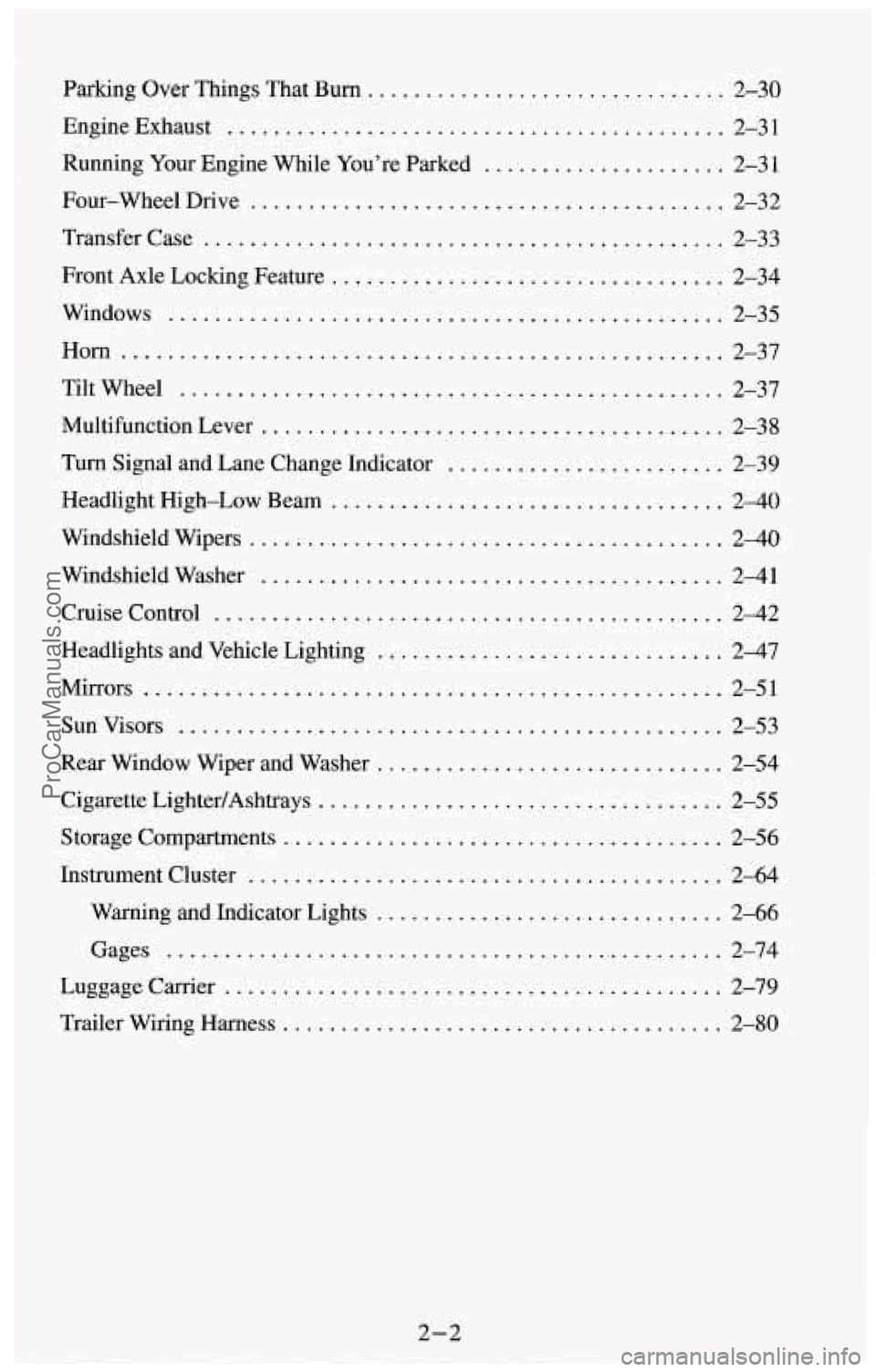
Parking Over Things That Burn ........................ ... 2-30
Running Your Engine While You’re Parked
..................... 2-31
EngineExhaust
........................................... 2-31
Four-WheelDrive
..................................... 2-32
Transfer Case
............................................. 2-33
Front Axle Locking Feature
.................................. 2-34
Windows
................................................ 2-35
Ho~ .................................................... 2-37
Tiltwheel
............................................. 2-37
Multifunction Lever
........................................ 2-38
Turn Signal and Lane Change Indicator
...................... 2-39
Windshield Wipers
......................................... 240
Headlight
High-Low Beam
................................ 2-40
Windshield Washer
........................................ 2-41
Cruise Control
........................................... 2-42
Headlights and Vehicle Lighting
.............................. 247
Mirrors
.................................................. 2-51
SunVisors
............................................... 2-53
Rear Window Wiper and Washer
.............................. 2-54
Storage Compartments
...................................... 2-56
Instrument Cluster
......................................... 2-64
Warning and Indicator Lights
.............................. 2-66
Luggagecarrier
........................................... 2-79
Trailer Wiring Harness
.................................... 2-80
Cigarette LightedAshtrays
............... ................ 2-55
Gages
................................................ 2-74
ProCarManuals.com
Page 102 of 385
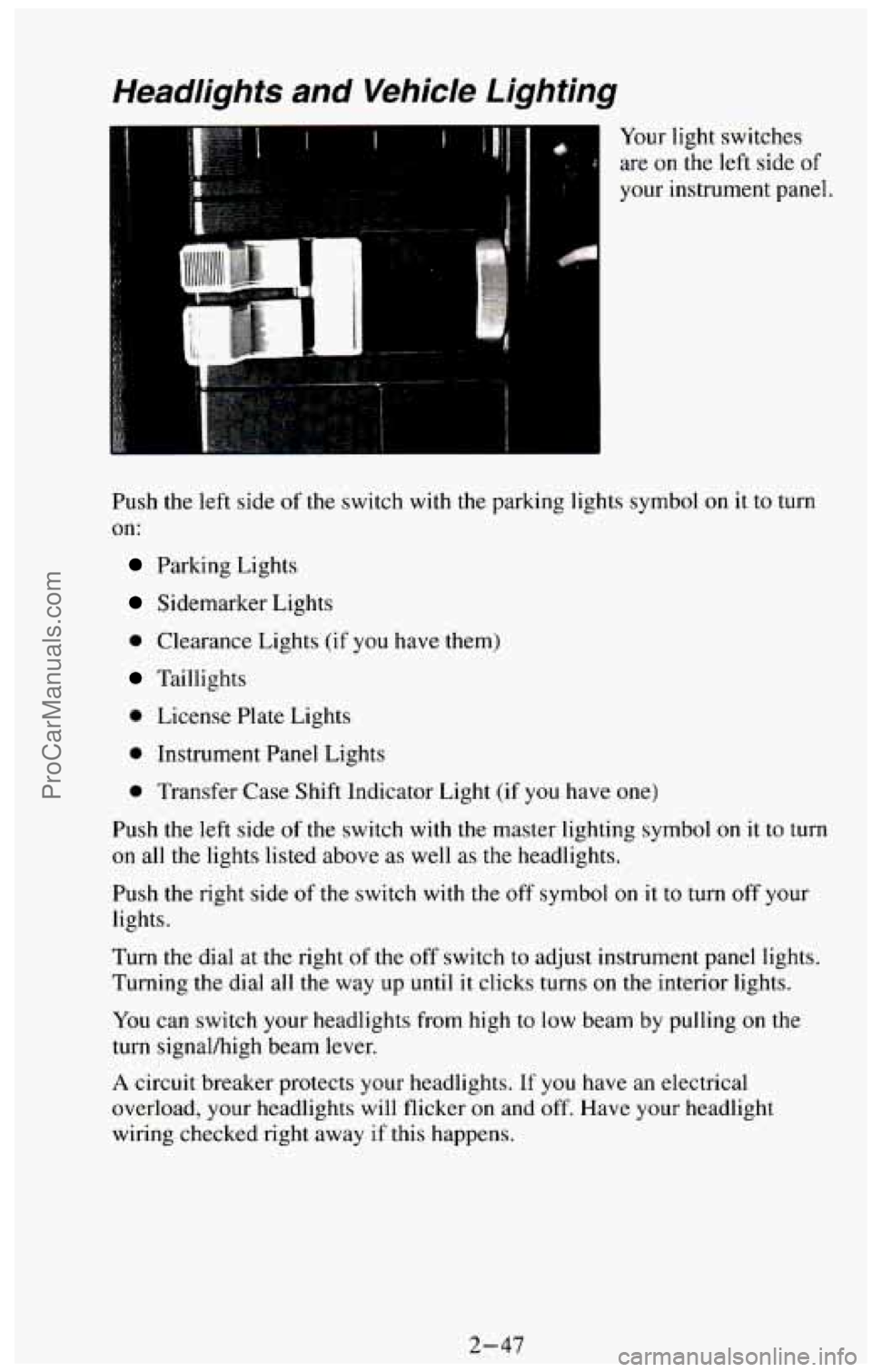
Headlights and Vehicle Lighting
Your light switches
are
on the left side of
your instrument panel.
Push the left side of the switch with the parking lights symbol on it to turn
on:
Parking Lights
Sidemarker Lights
0 Clearance Lights (if you have them)
Taillights
0 License Plate Lights
0 Instrument Panel Lights
0 Transfer Case Shift Indicator Light (if you have one)
Push the left side of the switch with the master lighting symbol
on it to turn
on all the lights listed above as well as the headlights.
Push the right side
of the switch with the off symbol on it to turn off your
lights.
Turn the dial at
the right of the off switch to adjust instrument panel lights.
Turning the dial all the way up until it clicks turns
on the interior lights.
You
can switch your headlights from high to low beam by pulling on the
turn signal/high beam lever.
A circuit breaker protects your headlights. If you have an electrical
overload, your headlights will flicker
on and off. Have your headlight
wiring checked right away
if this happens.
2-47
ProCarManuals.com
Page 135 of 385
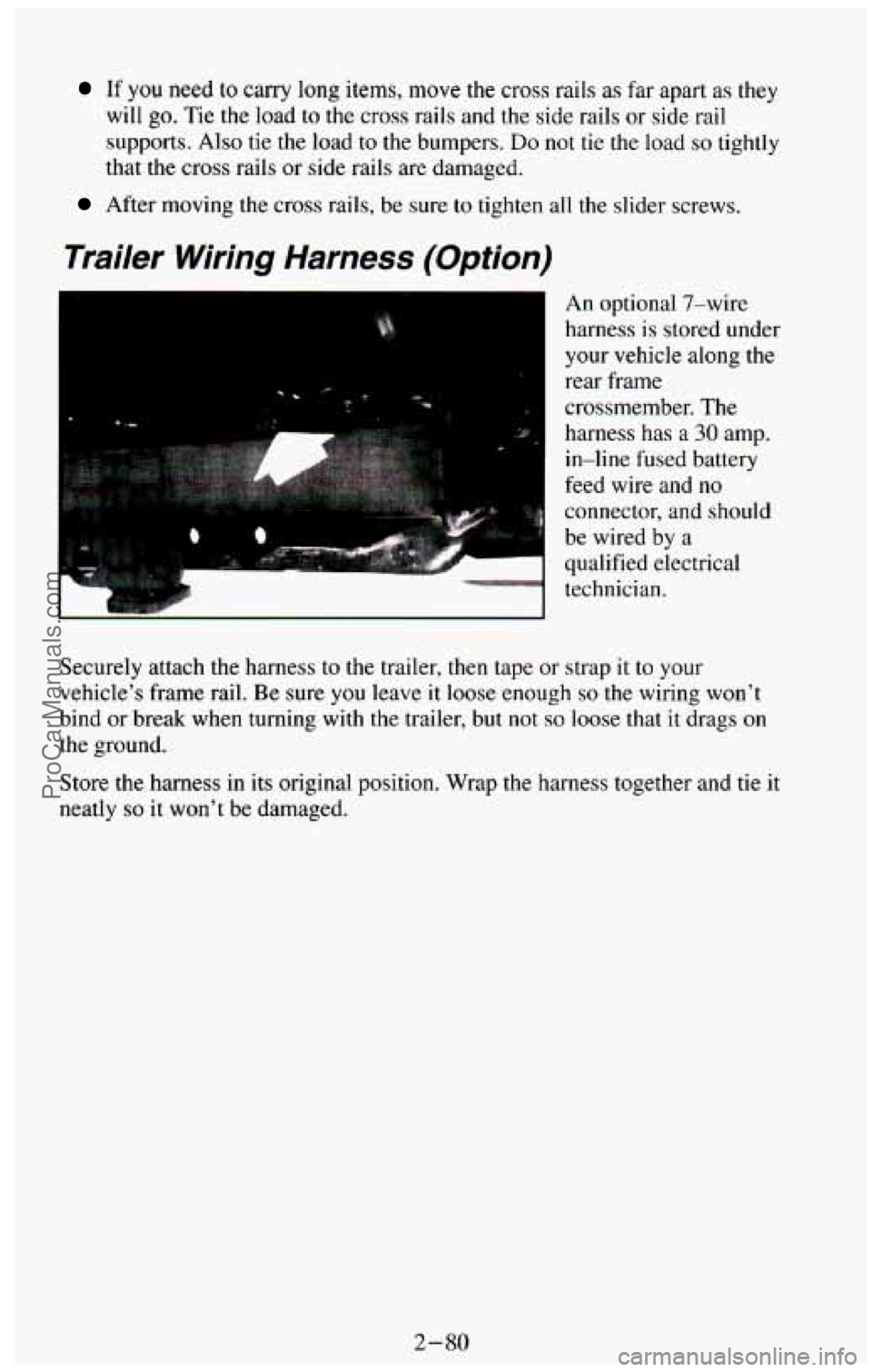
If you need to carry long items, move the cross rails as far apart as they
will go. Tie the load to the cross rails and the side rails or side rail
supports. Also tie
the load to the bumpers. Do not tie the load so tightly
that the cross rails or side rails are damaged.
After moving the cross rails, be sure to tighten all the slider screws.
Trailer Wiring Harness (Option)
An optional 7-wire
harness
is stored under
your vehicle along the
rear frame
crossmember. The
harness has a
30 amp.
in-line fused battery
feed wire and no
connector, and should
be wired by a
qualified electrical
technician.
Securely attach the harness
to the trailer, then tape or strap it to your
vehicle’s frame rail. Be sure
you leave it loose enough so the wiring won‘t
bind or break when turning with the trailer, but
not so loose that it drags on
the ground.
Store the harness in its original position. Wrap the harness together and tie it
neatly so it won’t be damaged.
2-80
ProCarManuals.com
Page 201 of 385
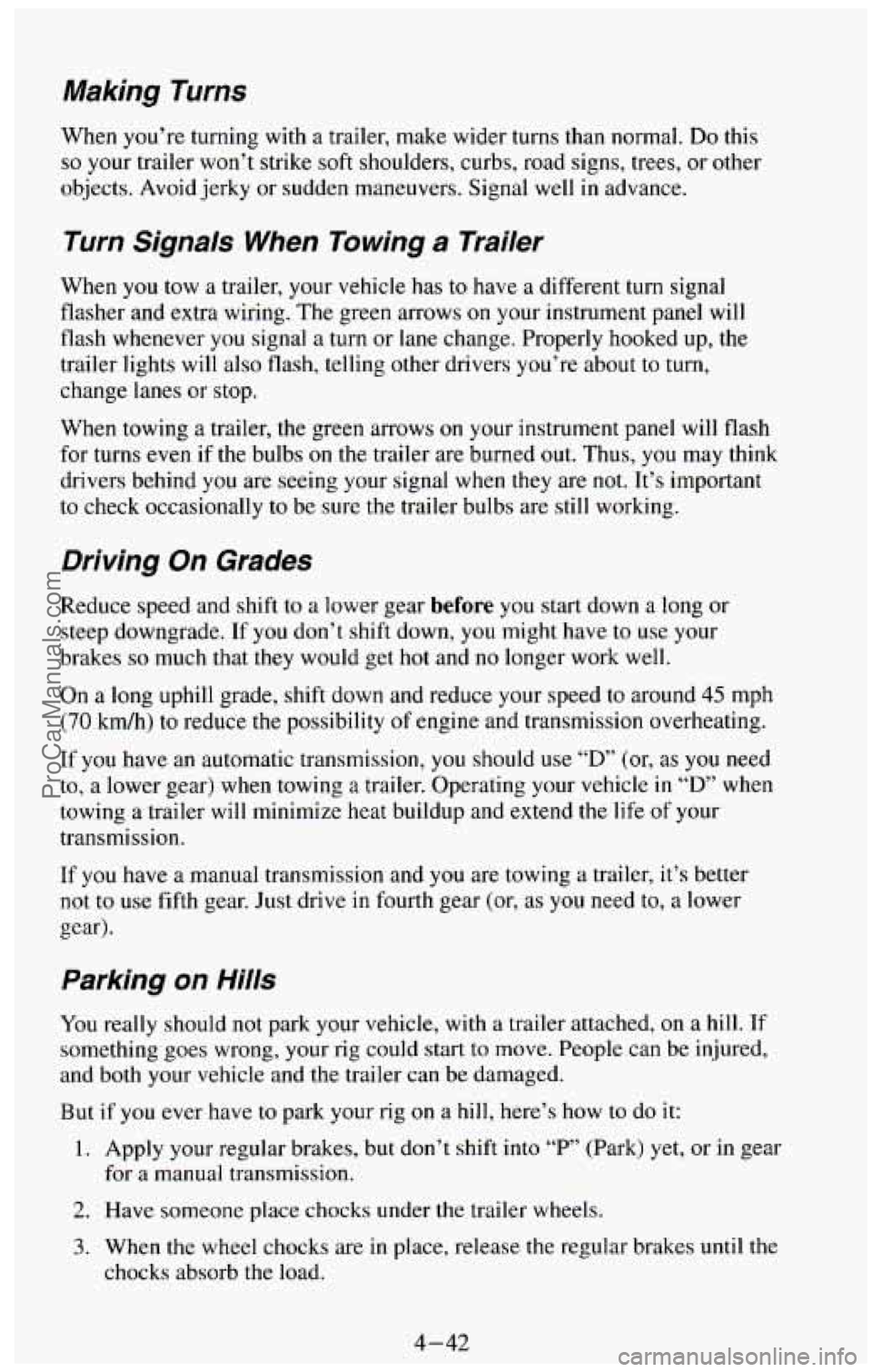
Making Turns
When you’re turning with a trailer, make wider turns than normal. Do this
so your trailer won’t strike soft shoulders, curbs, road signs, trees, or other
objects. Avoid jerky or sudden maneuvers. Signal well
in advance.
Turn Signals When Towing a Trailer
When you tow a trailer, your vehicle has to have a different turn signal
flasher and extra wiring, The green arrows on your instrument panel will
flash whenever you signal a turn or lane change. Properly hooked up, the
trailer lights will also flash, telling other drivers you’re about to turn,
change lanes or stop.
When towing a trailer,
the green arrows on your instrument panel will flash
for turns even if the bulbs on the trailer are burned out. Thus, you may think
drivers behind you are seeing your signal when they are not. It’s important
to check occasionally
to be sure the trailer bulbs are still working.
Driving On Grades
Reduce speed and shift to a lower gear before you start down a long or
steep downgrade. If
you don’t shift down, you might have to use your
brakes
so much that they would get hot and no longer work well.
On
a long uphill grade, shift down and reduce your speed to around 45 mph
(70 kdh) to reduce the possibility of engine and transmission overheating.
If you have an automatic transmission, you should use “D” (or, as you need
to, a lower gear) when towing
a trailer. Operating your vehicle in “D” when
towing a trailer will minimize heat buildup and extend
the life of your
transmission.
If
you have a manual transmission and you are towing a trailer, it’s better
not
to use fifth gear. Just drive in fourth gear (or, as you need to, a lower
gear).
Parking on Hills
You really should not park your vehicle, with a trailer attached, on a hill. If
something goes wrong, your rig could start to move. People can be injured,
and both your vehicle and the trailer can be damaged.
But
if you ever have to park your rig on a hill, here’s how to do it:
1. Apply your regular brakes, but don’t shift into “P’ (Park) yet, or in gear
for a manual transmission.
2. Have someone place chocks under the trailer wheels.
3. When the wheel chocks are in place, release the regular brakes until the
chocks absorb
the load.
4-42
ProCarManuals.com
Page 203 of 385
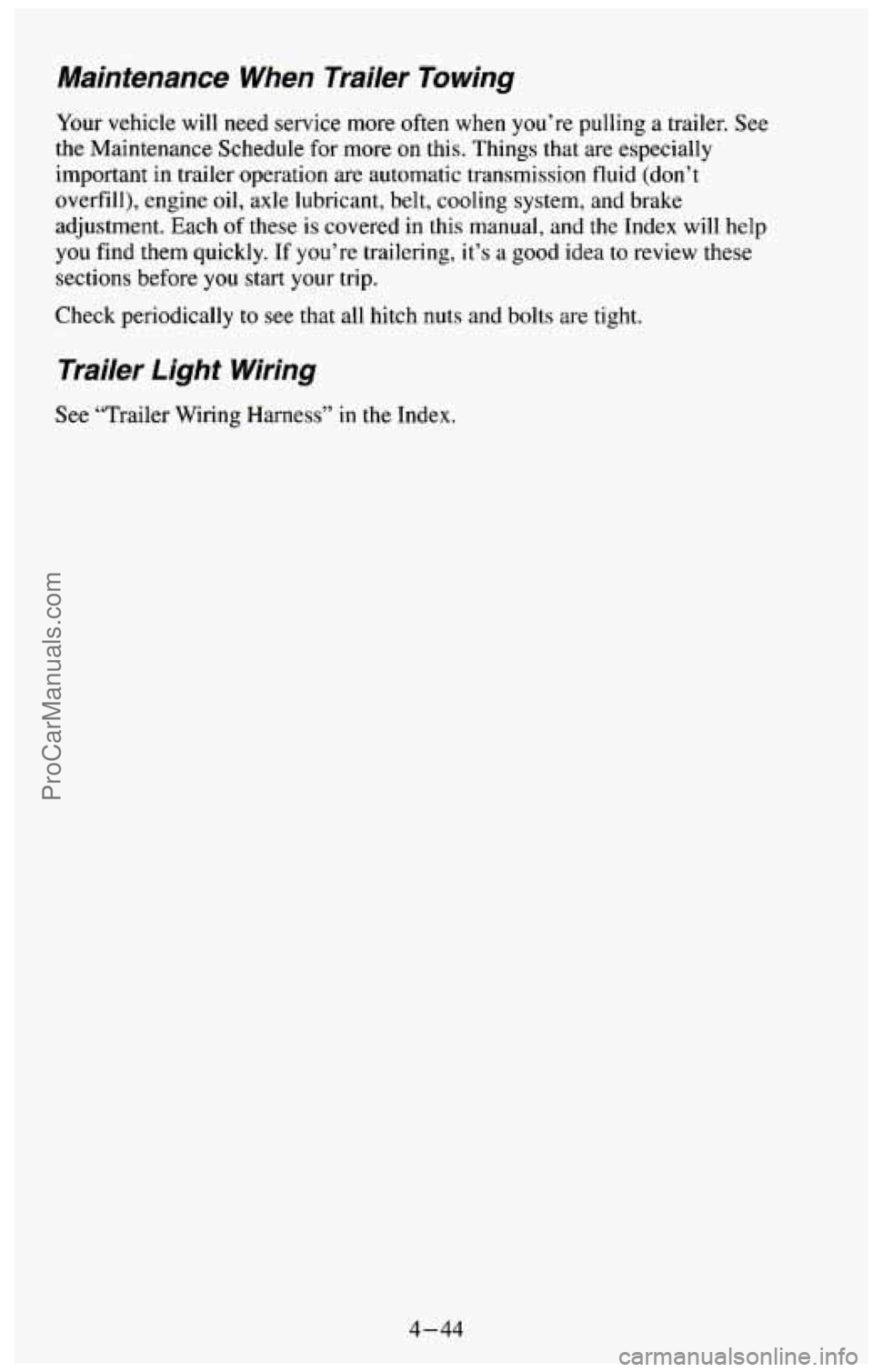
Maintenance When Trailer Towing
Your vehicle will need service more often when you’re pulling a trailer. See
the Maintenance Schedule for more on this. Things that are especially
important in trailer operation are automatic transmission fluid (don’t
overfill), engine oil, axle lubricant, belt, cooling system, and brake
adjustment. Each
of these is covered in this manual, and the Index will help
you find them quickly. If you’re trailering, it’s a good idea to review these
sections before you start your trip.
Check periodically to see
that all hitch nuts and bolts are tight.
Trailer Light Wiring
See “Trailer Wiring Harness” in the Index.
4-44
ProCarManuals.com
Page 301 of 385
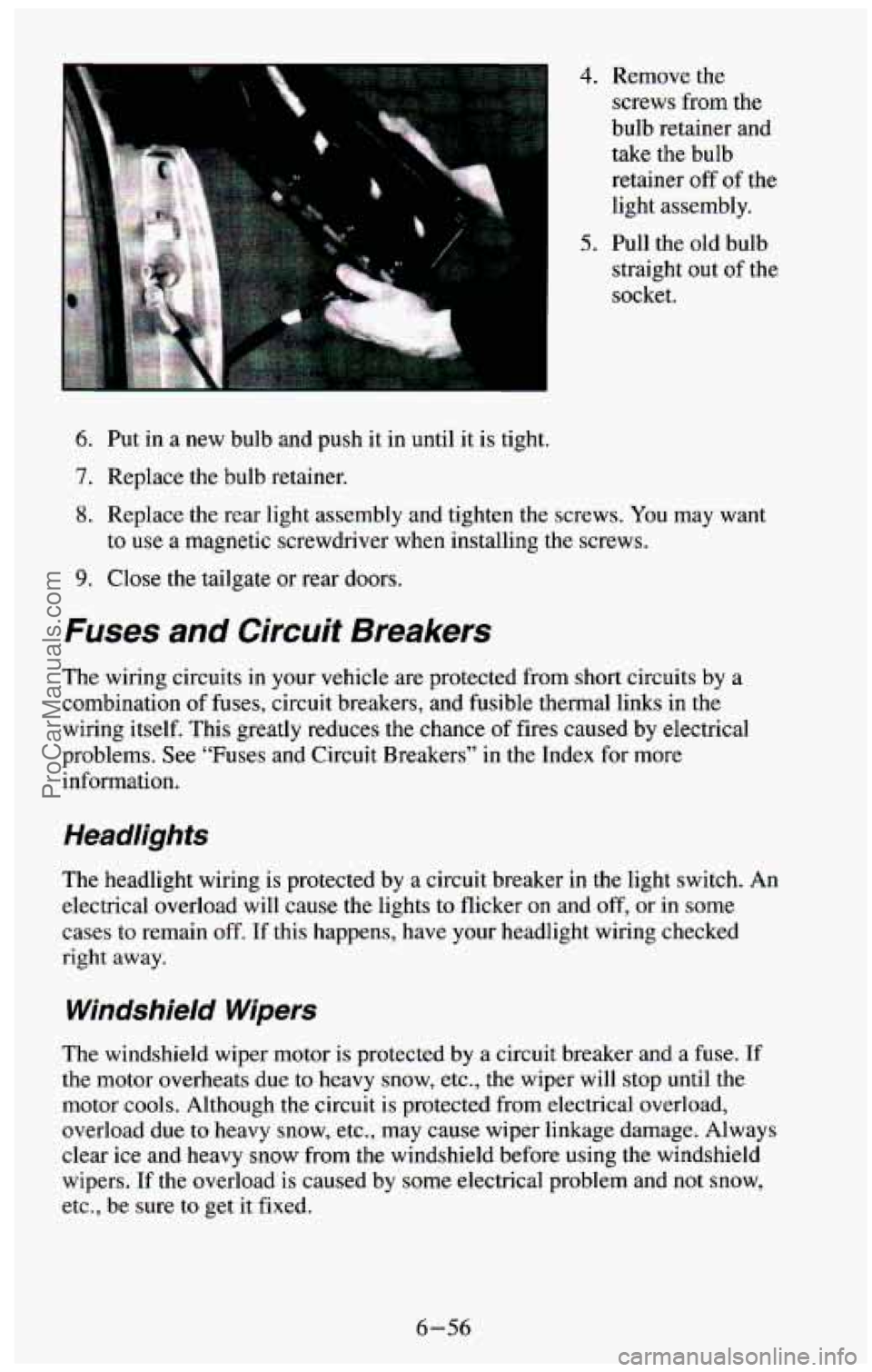
4. Remove the
screws from the
bulb retainer and
take the bulb
retainer
off of the
light assembly.
5. Pull the old bulb
straight out
of the
socket.
6. Put in a new bulb and push it in until it is tight.
7. Replace the bulb retainer.
8. Replace the rear light assembly and tighten the screws. You may want
to use
a magnetic screwdriver when installing the screws.
9. Close the tailgate or rear doors.
Fuses and Circuit Breakers
The wiring circuits in your vehicle are protected from short circuits by a
combination
of fuses, circuit breakers, and fusible thermal links in the
wiring itself. This greatly reduces the chance of fires caused by electrical
problems. See “Fuses and Circuit Breakers” in the Index for more
information.
The headlight wiring is protected by
a circuit breaker in the light switch. An
electrical overload
will cause the lights to flicker on and off, or in some
cases to remain off.
If this happens, have your headlight wiring checked
right away.
Windshield Wipers
The windshield wiper motor is protected by a circuit breaker and a fuse. If
the motor overheats due to heavy snow, etc., the wiper will stop until the
motor cools. Although
the circuit is protected from electrical overload,
overload due to heavy snow, etc., may cause wiper linkage damage. Always
clear ice and heavy snow from the windshield before using the windshield
wipers.
If the overload is caused by some electrical problem and not snow,
etc., be sure to get it fixed.
6-56
ProCarManuals.com
Page 302 of 385
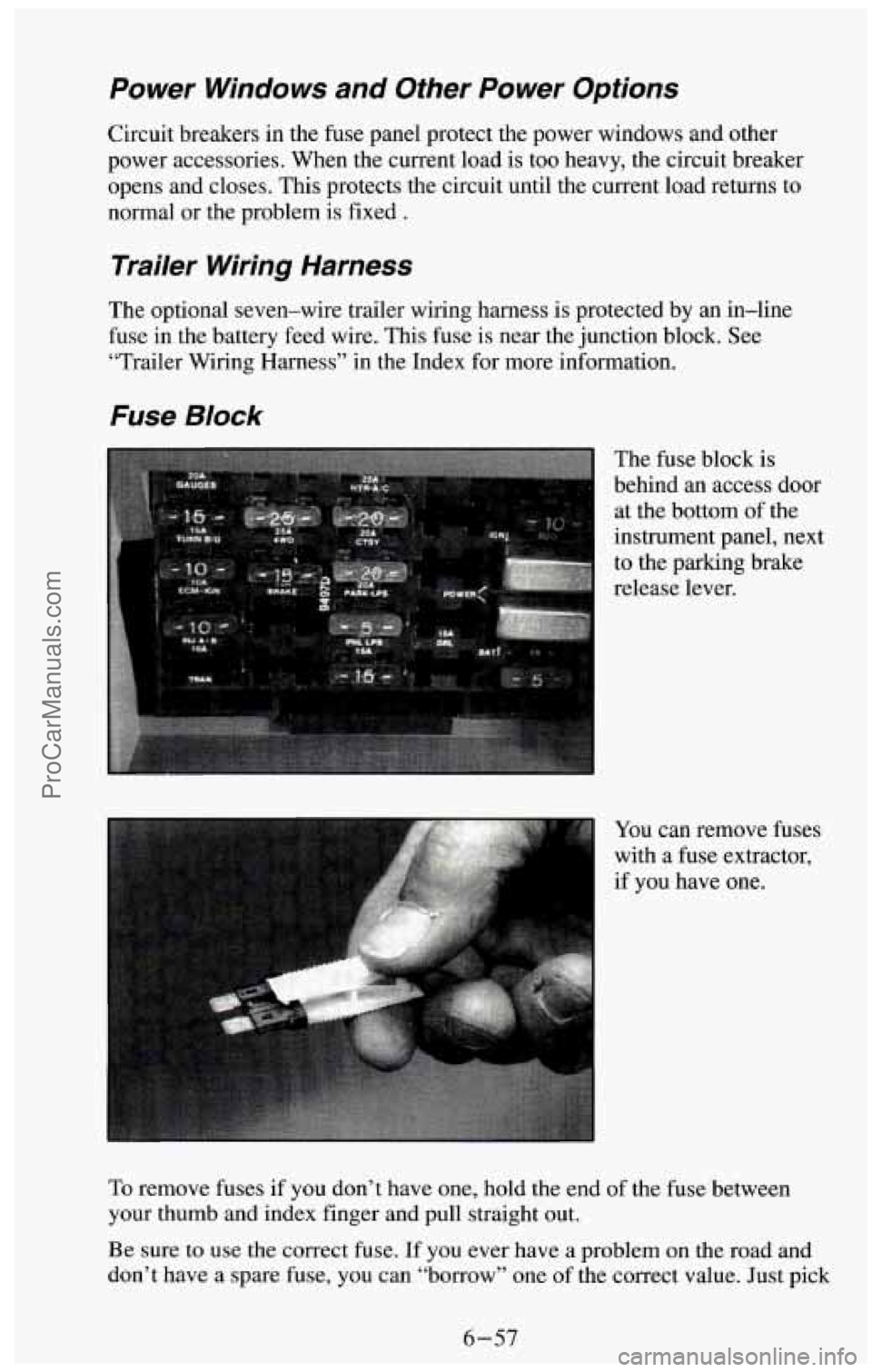
Power Windows and Other Power Options
Circuit breakers in the fuse panel protect the power windows and other
power accessories. When the current load is too heavy, the circuit breaker
opens and closes. This protects the circuit until the current load returns to
normal or the problem is fixed
.
Trailer Wiring Harness
The optional seven-wire trailer wiring harness is protected by an in-line
fuse in the battery feed wire. This fuse is near the junction block. See
“Trailer Wiring Harness” in the Index for more information.
Fuse Block
The fuse block is
behind an access door
at the bottom
of the
instrument panel, next
to the parking brake
release lever.
You can remove fuses
with a fuse extractor,
if you have one.
To remove fuses if you don’t have one, hold the end of the fuse between
your thumb and index finger and pull straight out.
Be sure to use the correct fuse. If
you ever have a problem on the road and
don’t have a spare fuse, you can “borrow” one of the correct value. Just pick
6-57
ProCarManuals.com
Page 378 of 385
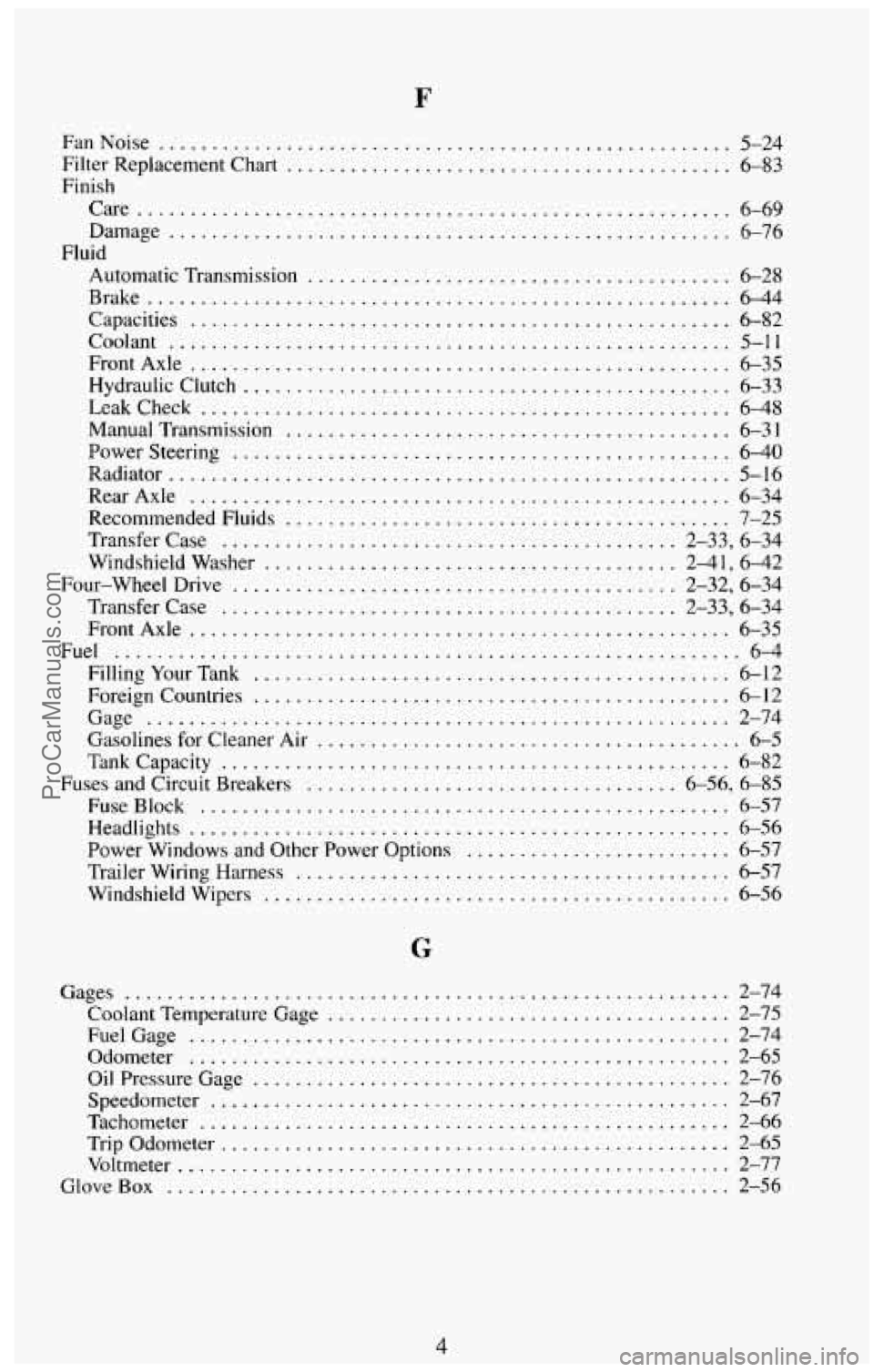
FanNoise ...................................................... 5-24
Filter Replacement Chart .......................................... 6-83
Finish Care
........................................................ 6-69
Damage
..................................................... 6-76
Automatic Transmission
........................................ 6-28
Brake
....................................................... 6-44
Capacities ................................................... 6-82
Coolant
..................................................... 5-11
FrontAxle ................................................... 6-35
Hydraulicclutch
.............................................. 6-33
Leakcheck .................................................. 6-48
ManualTransmission
.......................................... 6-31
Power Steering
............................................... 6-40
Radiator
..................................................... 5-16
Rear Axle ................................................... 6-34
Recommended Fluids
.......................................... 7-25
Transfer Case
........................................... 2-33, 6-34
Windshield Washer
....................................... 2-41, 6-42
Four-wheel Drive
.......................................... 2-32, 6-34
Transfer Case
........................................... 2-33, 6-34
FrontAxle
................................................... 6-35
Fuel
........................................................... 6-4
FillingYourTank ............................................. 6-12
Foreign Countries
............................................. 6-12
Gage
....................................................... 2-74
Gasolines for Cleaner
Air ........................................ 6-5
Tankcapacity
................................................ 6-82
Fuses and Circuit Breakers
................................... 6-56, 6-85
FuseBlock
.................................................. 6-57
Headlights
................................................... 6-56
Power Windows
and Other Power Options ......................... 6-57
Trailer Wiring Harness
......................................... 6-57
Windshield Wipers
............................................ 6-56
Fluid
G
Gages ......................................................... 2-74
Coolant Temperature Gage
...................................... 2-75
FuelGage
................................................... 2-74
Odometer
................................................... 2-65
Oil Pressure Gage ............................................. 2-76
Speedometer
................................................. 2-67
Tachometer
.................................................. 2-66
Trip Odometer
................................................ 2-65
Voltmeter
.................................................... 2-77
GloveBox
..................................................... 2-56
4 ProCarManuals.com